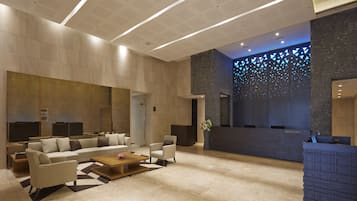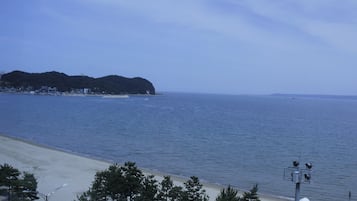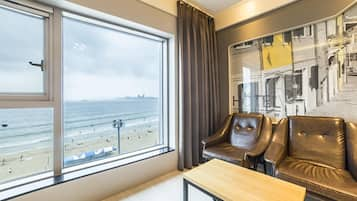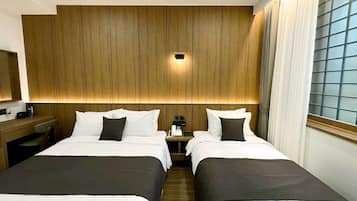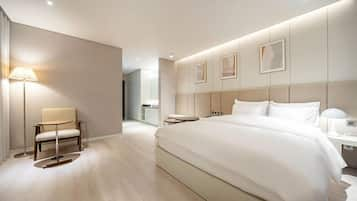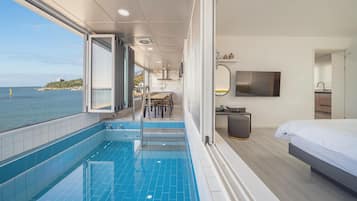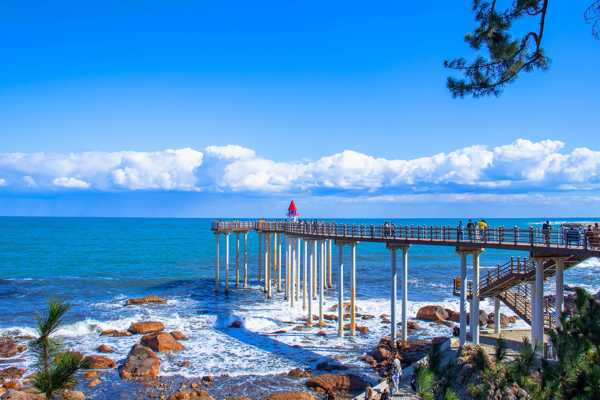Pohang is a city with many things to see and experience, such as the sea and sunrise, iron-making and robot technologies, temples and fortresses. The city has many well-known places that befit its status as Gyeongsangbuk-do's largest city; among them, Homigot Sunrise Plaza, one of the nation's most famous sunrise viewing spots, is a landmark of Pohang. The Igari Anchor Observatory and Yeongildae Marine Pavilion are places where you can stroll toward the sea as if walking on the waves and feel the sea breeze with your entire body.
Daewonsa and Oeosa, which are serene Buddhist temples, allow you to spend some quiet time to reflect on yourself, and the Gyeongsangbuk-do Arboretum is a place where you can heal your weary body and mind in green nature. Janggieupseong Walled Town is where the long history of Korea from the Goryeo to Joseon eras feels alive. Learn about the past and present of the city that grew into one of the major cities on the eastern coast at the Pohang Canal and National Lighthouse Museum, and discover the true value of the city symbolized by steel and robots at the Pohang Museum of Steel Art and the Robo Life Museum.
- 1
Homigot Sunrise Plaza
Place where the sun rises earliest in Korea

- Pasangan
- Keluarga
- Foto
Homigot Sunrise Plaza is a plaza at the eastern tip of the Korean Peninsula, which corresponds to the tail of the Korean Peninsula, which is often represented in the shape of a tiger. Homigot Cape competes with Ganjeolgot Cape in Ulsan over the title as the place where the sun rises first in Korea. Although the sunrise time differs on the season, there are more days when the sun rises first at Homigot Cape than in Ganjeolgot Cape throughout the year. The Hand of Mutual Shake, a bronze sculpture created in 1999 and established as a symbol of Homigot Cape, is a must-visit attraction for a terrific photo. Take a humorous photo by raising your arm and making the bronze hand seem to be positioned over the hem of your sleeve as if it's your hand, or by capturing the blazing red sun rising between your fingers.
Behind the plaza sits the New Millennium Memorial Hall, where you can comfortably appreciate the scenery of Homigot Cape from the observation deck in the hot summer or cold winter. On New Year's Day, people from all over the country rush to this place to see the first sunrise of the year. It is recommended to book your accommodations in advance, as vehicle traffic is controlled around the cape due to traffic congestion on New Year's Day. Rooms sell out sooner than you would think, so it is better to hurry so that your new year plans would not go awry from the start.
Lokasi: 20, Haemaji-ro 150beon-gil, Homigot-myeon, Nam-gu, Pohang-si, Gyeongsangbuk-do, South Korea
Telepon: +82 (0)54-270-5855
Petafoto dari Seongbin Im (CC BY-SA 2.0) dimodifikasi
- 2
Oeosa Temple
Simple and elegant temple with a beautiful trail

- Pasangan
- Keluarga
- Foto
Oeosa Temple was built during the reign of King Jinpyeong, the 26th king of Silla, and has been loved for its tranquil atmosphere and beautiful scenery. Regarding the origin of the temple's name, legend has it that two prestigious Buddhist priests, Masters Wonhyo and Hyegong made a bet about who would be able to revive dead fish, and when only one survived and swam again, they argued that it was their fish (“oeo”). As you enter the precincts of the temple, Daeungjeon Hall, Jajangam Hermitage, and Eungjinjeon Hall greet visitors. Thanks to the fresh air and unique tranquil atmosphere, you can relax and take a leisurely look around.
The Bronze Bell, designated as Treasure No. 1290, shows the traditions of Silla well, and the countless coins piled up around the bell tell how ardently people have prayed for their wishes. The Oeosa Museum is also a must-visit place. You can feel the presence of the past vividly looking at the hat that Master Wonhyo used along with various historical materials. The suspension bridge next to the temple is embroidered with lotus lanterns that add to its beauty when Buddha's birthday approaches. Walk along the trail across the bridge and immerse yourself in the charm of the quiet mountainous temple.
Lokasi: 1, Oeo-ro, Ocheon-eup, Nam-gu, Pohang-si, Gyeongsangbuk-do, South Korea
Buka: Daily from 4 am to 7 pm
Telepon: +82 (0)54-292-2083
Peta - 3
Igari Anchor Observatory
Observatory with a panoramic view of the clear blue sea

- Pasangan
- Keluarga
- Foto
The Igari Anchor Observatory deck stands 10 metres high stretches 102 metres towards Dokdo Island. Walking on this deck constructed over the sea, you will feel as if floating in the clear blue East Sea. The name “Anchor Observatory” was taken from the shape of the deck, which resembles an anchor when viewed from the sky. If you want to experience the sea up close, don’t miss out on the chance to walk on this deck. Admission closes before sunset, so be sure to arrive during operating hours. While walking on the deck, be careful not to let your belongings slip through the floor.
Igari Beach connected to the observatory has a beautiful scenery, and is a great place for camping or auto camping. Have a leisurely evening drinking soju or wine with the meat you grilled on the spot, listening to the sound of the waves, or dream of catching a big fish by casting a fishing rod in the quiet night sea. After watching the sun rise over the horizon at dawn, make your way up to the observatory once again and let the cool sea breeze start your day fresh.
Lokasi: San 67-3, Iga-ri, Cheongha-myeon, Buk-gu, Pohang-si, Gyeongsangbuk-do, South Korea
Buka: Daily from 9 am to 5 pm
Peta - 4
Gyeongsangbuk-do Arboretum
Have a healing time while breathing in the fresh air

- Pasangan
- Keluarga
Located at an average height of 650 metres above sea level, the Gyeongsangbuk-do Arboretum is a place where you can have a special experience as it features a unique plant distribution that is rarely found in other arboretums at low altitudes. The arboretum, established for the recreation and natural experience of citizens, has been collecting, conserving, and propagating major domestic and foreign arboreal resources since its opening in September 2001, while also conducting various research. You can gain the knowledge of the forest in various ways by interacting with the forest or participating in diverse experiential programs.
This arboretum, which consists of 26 gardens including the Alpine Botanical Garden, Ulleungdo Botanical Garden, and Coniferous Garden, is situated in a basin surrounded by high mountains. As a result, flowers here bloom and fall later than in other places. The fact that you can see seasonal flowers and plants later than on flat land is another reason that attracts visitors to this arboretum. Have a restful day breathing in phytoncides at the Gyeongsangbuk-do Arboretum, which offers different charms for each season.
Lokasi: 647, Sumogwon-ro, Jukjang-myeon, Buk-gu, Pohang-si, Gyeongsangbuk-do, South Korea
Buka: March–October: Daily from 10 am to 5 pm. November–February: daily from 9 am to 4 pm
Telepon: +82 (0)54-260-6100
Peta - 5
Yeongildae Maritime Pavilion
Landmark of beach beautiful both day and night

- Pasangan
- Keluarga
- Foto
Yeongildae Marine Pavilion is Korea's first maritime pavilion located at the end of a pier that stretches from Pohang Beach toward the sea. After passing the beach and walking to the end of the pier across a stone bridge, you can see a building that preserves the beauty of a traditional pavilion. Going up to the second floor, you can see the strikingly beautiful view of Yeongilman Bay and POSCO harmonized with the sea glistening in the sun.
At night, you can discover a new face of the pavilion, which is illuminated by golden lights. Take some marvellous photos by capturing the traditional-style building floating on the sea, the silvery moon that shows off its presence among colourful artificial lights, and the night view of POSCO in one frame. As it is Pohang's representative night view spot, you can take impressive pictures. Taking pictures with the pier and the pavilion in the background is nice, but it is also recommended to climb the pavilion and capture the beautiful scenery of the beach. This place widely known for its fantastic nightscape will offer wonderful moments you will want to capture in photos.
Lokasi: Samho-ro, Duho-dong, Buk-gu, Pohang-si, Gyeongsangbuk-do, South Korea
Buka: 24/7
Peta - 6
Pohang Canal
Scenic waterway in the city centre

- Pasangan
- Keluarga
- Foto
The Pohang Canal, completed in 2014, is Korea's only waterway in the city centre that has restored the environment that had been destroyed due to industrialization close to its original state. The canal that connects the Hyeongsangang River through Dongbin Inner Port to Songdo Beach has been transformed into a rest area for local residents and a tourist attraction that gathers people, reviving the vitality of the once abandoned waterway. The waterway, which was reclaimed under the impact of urbanization in the 1960s, leisurely traverses the city, after going through many ups and downs, as if representing the shift in value over time from development to coexistence with nature.
The Pohang Canal PR Hall is a place where you can get a glimpse into olden-day Pohang, the change process of Dongbin Inner Port, and the construction process of the canal in chronological order as well as appreciate the view of the outstretched canal. The Pohang Cruise, which starts from the Hyeongsangang River and sails to the East Sea through the canal, is an extraordinary experience not to be missed. It is a rare chance to look around the major landmarks of the city in a short time, including Pohang Ship, Songdo Beach, and POSCO.
Lokasi: Haedo-dong, Nam-gu, Pohang-si, Gyeongsangbuk-do, South Korea
Buka: 24/7
Telepon: +82 (0)54-270-5177
Petafoto dari Dlcl5213 (CC BY-SA 4.0) dimodifikasi
- 7
Pohang Museum of Steel Art
Meet various works of art themed with steel

- Pasangan
- Keluarga
- Foto
The Pohang Museum of Steel Art is the world's only steel art museum that showcases works of art related to steel, which forms the basis of local culture. In line with the purpose of its establishment, the collections and exhibitions have been focused on the identity of the city that has developed through the steel industry. Special exhibitions and educational programs with a much wider range of subjects provide citizens and tourists with opportunities to enrich their cultural experience.
The experiential programs run by the Pohang Steel Art Workshop allow participants to create their own artworks by making daily items, jewellery, or metal works using steel. Sculptures and installations in the outdoor exhibition zone create unique scenery, harmonized with the surrounding natural environment. After looking around various spaces in the museum, enjoy chatting with your companions in the cafe on the first floor.
Lokasi: 10, Hwanhogongwon-gil, Buk-gu, Pohang-si, Gyeongsangbuk-do, South Korea
Buka: April–October: Tuesday–Sunday from 10 am to 7 pm. November–March: Tuesday–Sunday from 10 am to 6 pm (closed on Mondays)
Telepon: +82 (0)54-270-4700
Peta - 8
Homigot Lighthouse and National Lighthouse Museum
White lighthouse that has guided ships since the modernization era

- Pasangan
- Keluarga
- Foto
Homigot Lighthouse, which was first lit up in 1908, has been illuminating the sea every 12 seconds to date, serving as a guide for ships. The architectural style of this lighthouse, which stands 26.4 metres in an octagonal shape without the use of reinforcing bars, is so unique that it is still a novelty today. The lighthouse has 6 floors, and on the ceiling of each floor, a plum flower pattern symbolizing the Korean Empire is beautifully engraved, adding to the antique look of the lighthouse.
The National Lighthouse Museum is a place that preserves various artefacts and tells stories related to lighthouses. After the opening of the port in the late 1800s, navigation beacons have contributed to the development of maritime traffic and industry through modern times to the present. The Exhibition Hall displays various documents and equipment related to lighthouses and navigation beacons and the Experience Hall provides a variety of experiences on the sea and sailing in both analogue and digital formats. Life-size models of air siren trumpets, air compressors, light buoys, and buoys are displayed in the outdoor exhibition space to satisfy the intellectual curiosity of visitors.
Lokasi: 20, Haemaji-ro 150beon-gil, Homigot-myeon, Nam-gu, Pohang-si, Gyeongsangbuk-do, South Korea
Buka: Tuesday–Sunday from 9 am to 5 pm (closed on Mondays)
Telepon: +82 (0)54-284-4857
Petafoto dari Paul Bailey (CC BY-SA 2.0) dimodifikasi
- 9
Daewonsa Temple
Mysterious temple filled with the auspicious energy of a dragon

- Keluarga
- Sejarah
- Foto
Daewonsa, a temple of Seon (Zen) Buddhism of Korea, has become famous for its unique structure where visitors can enter a hall through the entrance in the form of the mouth of a dragon. As you set foot in the temple, a blue dragon with wide-open red eyes and a cintamani (magical jewel) in its mouth is seen on the left. Cross the small Seungcheongyo Bridge and step into the entrance in the shape of the mouth of the dragon, as if being swallowed, then you will find yourself in a hall displaying Buddha statues and paintings. After passing through the hall, which represents the body of the dragon, and walking to the end of the hall, which forms the dragon's tail, you will see a unique statue of Buddha standing as if conveying the energy of the dragon.
Make a wish in front of the statue and admire the blue East Sea on the way back to shake off all your worries. Even if you're not a Buddhist, the serene atmosphere and surrounding scenery will bring joy and peace to your mind. You can easily get to the temple through a gently-sloped trail, hearing the sound of birds chirping merrily. Visit this quiet temple and escape from the hustle and bustle of city life.
Lokasi: 24, Haean-ro 1545beon-gil, Heunghae-eup, Buk-gu, Pohang-si, Gyeongsangbuk-do, South Korea
Buka: 24/7
Telepon: +82 (0)54-261-7777
Petafoto dari buddhaflow (CC BY 2.0) dimodifikasi
- 10
Janggiupseong Walled Town
Strong wall that protected the country against foreign powers

- Pasangan
- Keluarga
- Sejarah
- Foto
Janggieupseong Walled Town, designated as Historic Site No. 386, is a fortress with a long history built in preparation against the invasion of the Jurchen and the Japanese. It was first constructed in 1011 AD, the 2nd year of the reign of King Hyeonjong of Goryeo, as an earthen fortress to fend off the Jurchen that would invade through the east coast. The shape of the present fortress was completed in 1439 during the Joseon era, rebuilt with stones to defend the region from Japanese invasions. As there is no significant difference between the size of the fortress recorded in ancient documents and the current size, it has great value for research.
Past the Janggihyanggyo Local Confucian School, go up to the north gate of the fortress and walk on the neatly piled up stone walls. You will be able to enjoy the scenery that seems to touch the sky and take great photos. There are destroyed ramparts that have not yet been restored. The presence of the past is felt up to the present when walking here. On the way back, visit the Homes in Exile of Uam Song Si-yeol and Dasan Jeong Yak-yong, which are located 500 metres away from the fortress and learn about the related events that added pages to history.
Lokasi: 127-2, Eumnae-ri, Janggi-myeon, Nam-gu, Pohang-si, Gyeongsangbuk-do, South Korea
Buka: 24/7
Telepon: +82 (0)54-245-6062
Petafoto dari Black207 (CC BY-SA 2.0) dimodifikasi
- 11
Robo Life Museum
Experience the present and future of cutting-edge robotic technology

- Keluarga
- Sejarah
- Foto
Robo Life Museum, Korea's top robot experience and exhibition centre, is a place where you can experience cutting-edge technology and future lifestyle. It is a valuable experiential learning site for students and a unique leisure space for adults where they can meet cutting-edge culture. In the AI Robot Interest Centre, you can learn about the history of robots and how robots are used in everyday life, while in the AI Robot Experience Centre, you can get a first-hand experience of robot manipulation and understand the principles of robots.
The KIRO PR Centre showcases robots developed by the Korea Institute of Robot and Convergence. Experience how far robot technology has advanced in the Robot Training Room and 3D Printing Zone and enjoy a cup of coffee made by a robot at the Robot Cafe to bring a perfect end to your exciting day. You can experience robot technology more intensely through a robot-guided tour, which is only available by making a reservation online. Be sure to make a reservation in advance, as reservations cannot be made on the day of visit.
Lokasi: 39, Jigok-ro, Nam-gu, Pohang-si, Gyeongsangbuk-do, South Korea
Buka: Tuesday–Sunday from 10 am to 6 pm (closed on Mondays)
Telepon: +82 (0)54-279-0427
Peta




